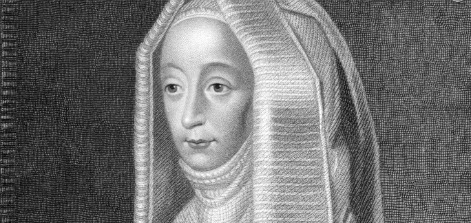Author Elizabeth Fremantle has come across an indomitable grandmother or two while researching her historical novels, and if you thought your mother-in-law was meddling, just wait 'til you hear about some of these dauntless Tudor grandmothers…
When you think of Tudor women it is Henry's six wives, Elizabeth I or her sister "Bloody Mary" that spring to mind, and we rarely hear about history's grandmothers. With the atomisation of modern families, today’s grandmothers can often feel left out of their grandchildren's lives. The Tudors though, did it differently. Families were like tribes and grandparents, particularly from the nobility, often played a powerful role in decision making for the younger generations, particularly when it came to marriage. Marriages were the key to social advancement and there is a pair of indomitable Tudor grandmothers whose stories demonstrate the extent of their influence.
When the first Tudor king, Henry VII, came to the throne his position was tenuous: a crown plucked from the battlefield; a dubious lineage; potential pretenders at large. But thanks to the steely ambition of the King's mother, Lady Margaret Beaufort, by the time her grandson Henry VIII was on the throne the Tudor dynasty had its silken slippers firmly under the royal table. It was Margaret Beaufort who brokered the marriage between her Lancastrian son and the Yorkist Princess Elizabeth: a match that was to end the Wars of the Roses and see the birth of the Tudor.
Margaret Beaufort, came from a prestigious line and was a pawn in the conflict between Lancaster and York. Her marriage to Edmund Tudor, who had dubious ancestry and only French royal blood, was a power play that would place the upstart Tudors closer to the throne. Aged only twelve Margaret was a pregnant widow and nearly died giving birth to her son Henry Tudor. It was her intelligence, ruthless ambition and deep conviction that God was on her side that saw Henry eventually, against all odds, on the throne and she was determined to ensure that he stayed there.
Grandparents, particularly from the nobility, often played a powerful role in decision making for the younger generations.
She drew up a set of protocols for royal births and ensured that the Tudor princes and princesses were raised according to her strict standards. If her royal grandchildren came from dubious stock she was going to make absolutely sure nobody remembered that fact, and she helped establish the belief that her son’s path to the throne was sanctioned by divine providence. The King’s mother insisted on having rooms next to her son’s wherever he was and accompanied him on state occasions - in short she was the mother-in-law from hell.
She saw Henry negotiate prestigious marriages for her grandchildren that would further establish the dynasty: eldest son Arthur with his marriage to Catherine of Aragon linked the Tudors to the most powerful family in Europe and the eldest daughter became Queen of Scotland spawning a dynasty that would, a century later, unite Scotland and England. Margaret Beaufort lived long enough to see her favourite grandson come to the throne as Henry VIII and wed his brother’s Spanish widow, but not long enough to see him cast aside his wife in favour of his mistress Anne Boleyn. One can only imagine she must have turned in her grave.
Margaret Beaufort’s great-granddaughter, another Margaret - Lady Margaret Douglas - the daughter of the Queen of Scotland, was to prove every bit as determined as her great-grandmother to ensure that her progeny kept as close to the seat of power as it was possible to be. Margaret Douglas had been a wild and spirited girl, a poetess who was imprisoned in the Tower of London by her cousin Henry VIII twice for unsanctioned romantic liaisons, and countless times by his daughter Elizabeth I for her political ambition on her children’s behalf.
Her son was Lord Darnley, the fateful husband of Mary Queen of Scots, who was murdered in a mystery that was never to be solved. It was Margaret Douglas who had schemed for Darnley’s marriage to the Scottish Queen and found herself festering in the Tower as a result. She knew by then that Elizabeth I wouldn’t produce an heir of her own and the Stuart line had the strongest claim on the English throne. The grandson that the controversial marriage produced, James VI, may have been full of Tudor blood but he hadn’t been born on English soil, which sullied his claim on the English throne. However Margaret Douglas had a second son, Charles, who might shore up the family’s ambitions by fathering a child. Without the Queen’s permission and far from court, Margaret brokered a secret marriage for Charles. The Queen was enraged when she learned of the unsanctioned match, but there was little she could do and the union produced a daughter, Arabella Stuart, meaning the elderly Margaret Douglas could pass away in the knowledge that one of her grandchildren was bound to end up on the throne of England. It was James Stuart who finally succeeded Elizabeth I, uniting Scotland and England at last.
Elizabeth's new book, Sisters of Treason, is out now and is published by Penguin.





